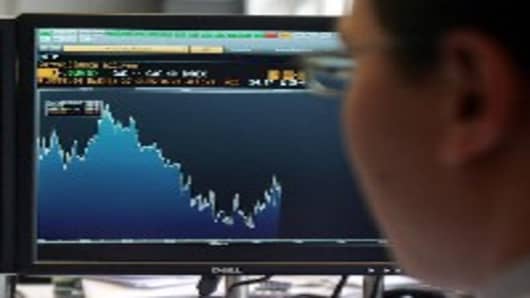The recent market volatility and subsequent rise in trading volumes means it should be party time for the stock exchanges. But as NYSE Euronext and Deutsche Borse prepare to report on first quarter earnings on Tuesday, the industry finds itself facing a number of problems and traders would be forgiven for selling in May and staying well away.
Last year new regulations went into effect in Europe that allowed new entrants into the market for trading securities. While not yet having a major impact on earnings at the big players, the likes of Chi-X and Project Turquoise have big hopes for the European market.
Technology is also causing headaches for management teams in the industry. The Nasdaq bought Nordic operator OMX last year in no small part due to its cutting edge software systems. CEO Bob Greifeld plans to take on the pan-European market offering 90 percent discounts on trading fees which will make like difficult for NYSE Euronext, Deutsche Borse and the LSE.
If new high tech competition breathing down their necks is not enough to scare investors, then the battle for new listings is also getting serious. The LSE had a cracking 2006 and was attracting more and more listings from the former Soviet Union and Asia. Their success has forced the whole industry to become more competitive, and listing fees are being forced down by the battle for new business.
If we are heading into a global slowdown, it's possible trading volumes will get weaker. So while we're expecting more strong profit growth tomorrow shares, in both the exchanges are down over 25 percent this year.
Don’t go shopping in the US!
When I was 10, a pair of Adidas trainers (sneakers to our US readers) were a must-have. Run DMC were very cool, and they wore Adidas, so I wore Adidas. By the time I was 15 it was all about Reebok trainers. Like most teenagers I lacked the individuality to do anything other than follow all my friends, so I bought numerous pairs of "Classics".
When Adidas bought its US rival, memories of my youth on the streets of London came flooding back, and I had to cringe. What a fool I must have looked in my overpriced, made-in-China shoes that cost 4 weeks' worth of paper route money per pair.
Nearly three years after the €3.1 billion buy, Adidas CEO Herbert Hainer must have a similar feeling. Quarter after quarter, Hainer has had the shine taken off his earnings presentations by the underperformance of Reebok.
Adidas-branded goods have continued to do well, with emerging market growth particularly strong. On Tuesday the company is expected to unveil a healthy 22 percent jump in first-quarter profits, but analysts predict more weakness from Reebok, and shares are off by 21 percent this year as a result.
If only Hainer had not listened to the investment bankers, he may now not be feeling like an unfashionable 15-year-old from North London. Oh well, he can at least look forward to being one of the main sponsors of the Olympics later this year. Doh!


